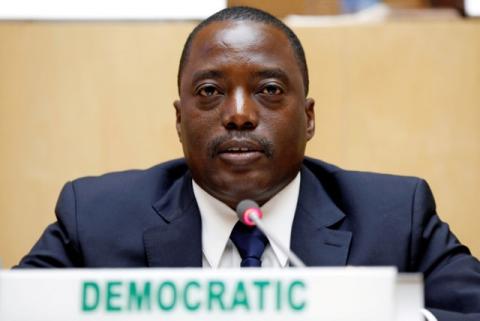Advertisement
Congo opposition says not planning mass protest at end of Kabila term
KINSHASA (Reuters) - Democratic Republic of Congo's main opposition bloc said on Saturday it was not planning a march against President Joseph Kabila when his mandate expires on Monday, a decision that could defuse anticipated protests.
The opposition accuses Kabila of trying to cling to power, and the decision not to stage a mass protest was announced hours after talks between the opposition and ruling coalition failed to reach a compromise on Kabila's political future.
"We are not going to have a march to give these bandits the opportunity to fire on the population," opposition leader Felix Tshisekedi told Reuters. He said he expected people to remain vigilant and protest "each in his own way".
However, it is not clear how much influence a largely discredited political opposition holds over an angry and impoverished population and authorities were bracing for unrest.
Kabila, who has ruled since 2001, is barred by the constitution from standing in the next election, which was originally scheduled for last month.
The government says it cannot organize a presidential vote until 2018 and the constitutional court ruled in May he can stay on until then.
Delegates at the political talks said they would resume on Wednesday once the Catholic bishops mediating the negotiations have returned from a trip to Rome to meet Pope Francis.
In a statement, the opposition said differences remained over how the country would be governed after Monday and whether Kabila would commit to not changing the constitution to seek a third term.
Kabila says he is committed to respecting the constitution but has refused to promise not to change it. The presidents of neighboring Rwanda and Congo Republic changed their constitutions last year to allow themselves to stand for third terms.
While Tshisekedi said the talks had "failed", another opposition leader, Joseph Olengankhoy said they had made "significant progress".
Government spokesman Lambert Mende told Reuters he was confident the two sides would reach a compromise after the bishops met in recent days with Kabila and the main opposition leader, Etienne Tshisekedi.
Mende said authorities had taken measures to prevent violence on Monday. Police in Kinshasa have set up checkpoints to search cars and the government has asked telecoms companies to cut most social media services from Monday.
Congo has not seen a peaceful transfer of power since independence in 1960 and world powers fear protests, particularly in the sprawling capital of Kinshasa, could spark violence in the chronically unstable central African giant.
(Editing by Matthew Mpoke Bigg and Helen Popper)



















Add new comment